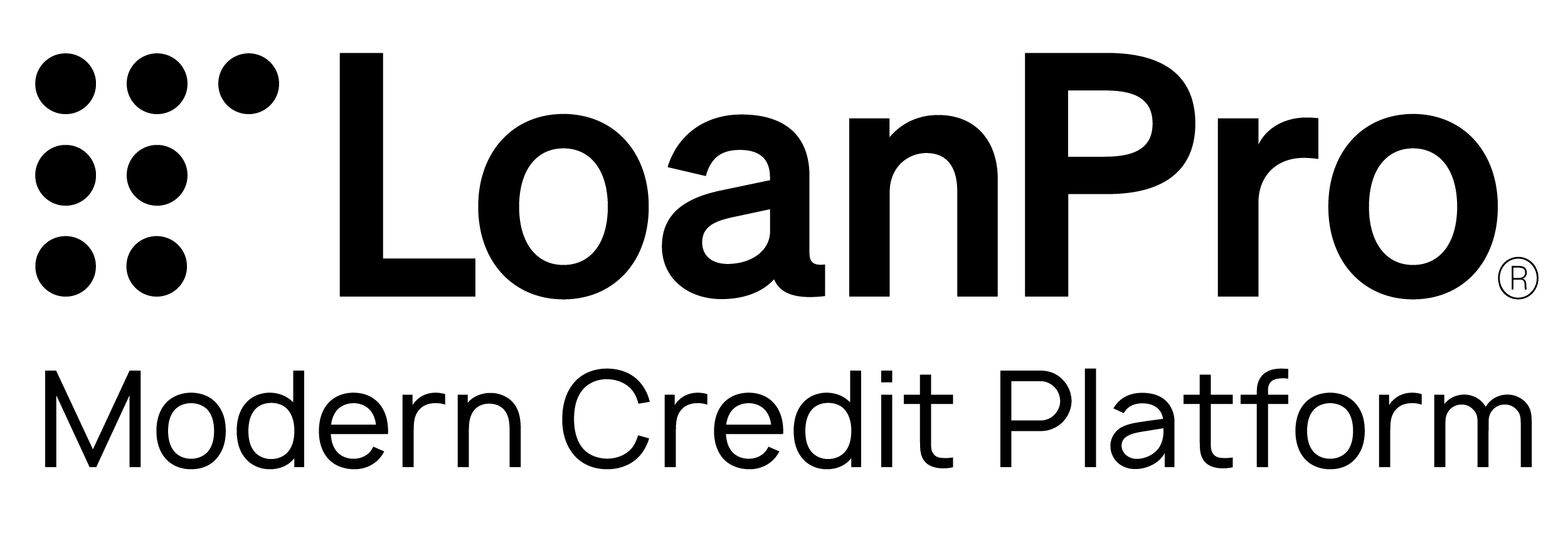Variable interest rates
Set up variable interest rates on your installment accounts.
Variable interest rates let you create loan products that adjust dynamically with the market. With LoanPro, you save the variable interest indexes in the software, and then use those indexes when creating and updating loans. This article will explore how to set up indexes at the tenant level and use them on individual accounts.
Configuring variable interest rates
There's two steps to using a variable interest rate:
- Create a rate index at the tenant level.
- Configure a loan that uses that index.
Create an index
To create an index, navigate to Settings > Loan > Setup New Loan > Variable Interest Rates. Here, you'll see a table of your existing indexes. Click ‘Add’ to create a new index or click the pencil icon to the right of any existing index to edit it. The settings are the same.

In the popup window, configure the following settings.
| Setting | Description |
| Index name | A descriptive name for the index. |
| Active | A toggle switch that determines whether the index can be used on loans. |
| Rate index |
The actual index that the system will use to pull the variable interest rates. Your options include the following:
|
| Rate type | This determines whether the system will use the High, Low, or Closing rate for the index. The field is available for every Rate Index except ‘No Index’, which manually sets its rates with the two fields below. |
| Date | The start date for the index. This field is only available if you've chosen ‘No Index’ as your Rate Index. |
| Rate | The start rate for the index. This field is only available if you've chosen ‘No Index’ as your Rate Index. |
Once you've set up info, click ‘Save’. You'll be taken to a page where you can edit any of the previous settings, and also see the rate history for your index. You can use the ‘Filter Date’ options to view the rates from a specific period.

Clicking ‘Save’ again will bring you back to the main page that lists all your indexes. If you decide you'll no longer use an index, click the trash icon to delete it.
Configure a loan
Inside Account Setup > Setup Terms > Loan Terms, you'll see the options for interest rate.

Here's a breakdown of the options:
| Setting | Description |
| Interest Rate | If you were configuring a fixed rate, you'd use this field to manually input your rate. But with a variable interest rate, this field will display the rate based on your index and the other fields below. |
| Method | Toggle between a fixed or variable interest rate. |
| Index | Select one of your indexes. |
| Lookup Date | Date when the system will first check your variable rate. |
| Margin | Enter a positive or negative number that will be added to the variable rate. For example, you have a margin of -5 and the variable rate is 13.6%, then the loan's actual interest rate will be 8.6%. |
| Min & Max | Set lower and upper bounds on the variable interest rate. |
Besides the interest settings, you'll also have the other settings on the Loan Terms page.
Updating Loans
Once you’ve finished creating an index, you can update the variable interest rates on pre-existing loans individually or with an automated process.
Updating multiple loans
Instead of having to go into each loan individually to update the variable rate, you can automate this process by using Advanced Connection to automatically update the interest rate on a set frequency. To do this, you'll need to do the following:
- Set up labels for loans with variable rates. This will help you write the rule to tell the webhook which loans to update the variable rate. These can be custom fields, computation fields, portfolios, etc.
- Create a trigger-based notification to send an Advanced Connection. Because this process involves a variety of tools in the software, we recommend reaching out to your LP representative to help set this up in your tenant. If you're already familiar with trigger-based notifications and webhooks, you can read our Advanced Connections article for a more in-depth guide on how to use Advanced Connections in LoanPro.
Updating an individual loan
Using the UI to update a loan's variable rate will only change it one time—the interest rate will not continually update. If you want it to continually update a variable rate on a loan, you'll need to use the API.
If you're looking to update an individual loan's variable interest rate, you can do this in the UI by using the Interest Rate Change tool.
In an individual account, navigate to Account Setup > Setup Tools. Click the three lines on the left side of the page and select ‘Interest Rate Change’ from the menu. Click ‘Add’ at the top right. Fill in the ‘Description’ field then change the ‘Adjustment Method’ to ‘Variable.’

You'll be presented with the same options for variable interest rates when configuring a loan. If you want to use the index that was used when the loan was set up, click ‘Use Setup Values’ and the ‘Index’ will change to the pre-configured index. Otherwise, fill in the rest of the fields for the variable interest rate. Click ‘Save’ when you're finished.
Payment recasting
Payment recasting will update a loan's payments to reflect the interest rate change. Please note that this feature is not built out as a UI feature in LoanPro. Changing a loan's interest rate in LoanPro will only adjust how interest accrues rather than adjust how much a borrower owes on a scheduled payment.
If you're interested in using payment recasting, reach out to a LoanPro representative to help configure it for you.
Was this article helpful?
Unclassified Public Data
